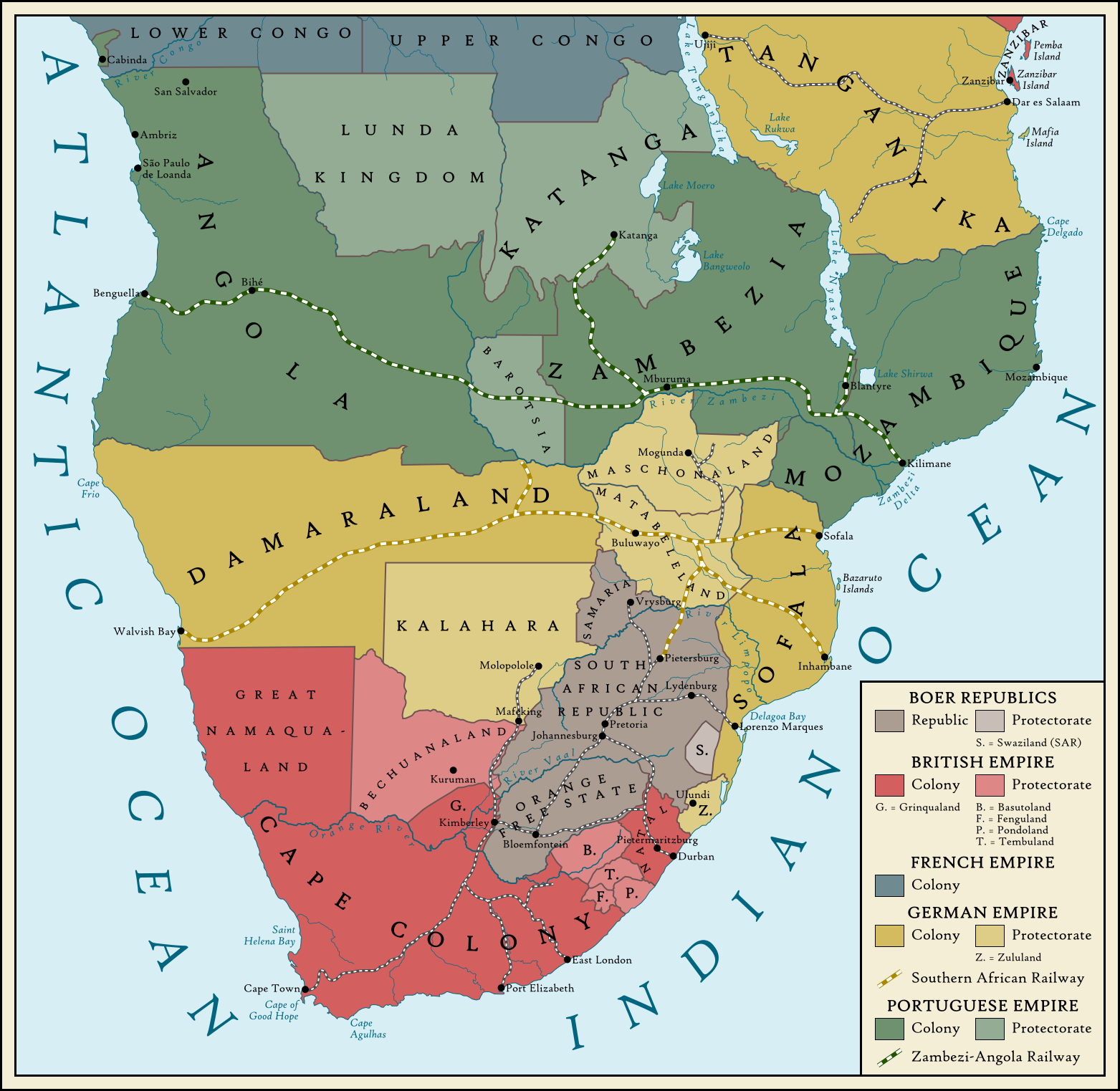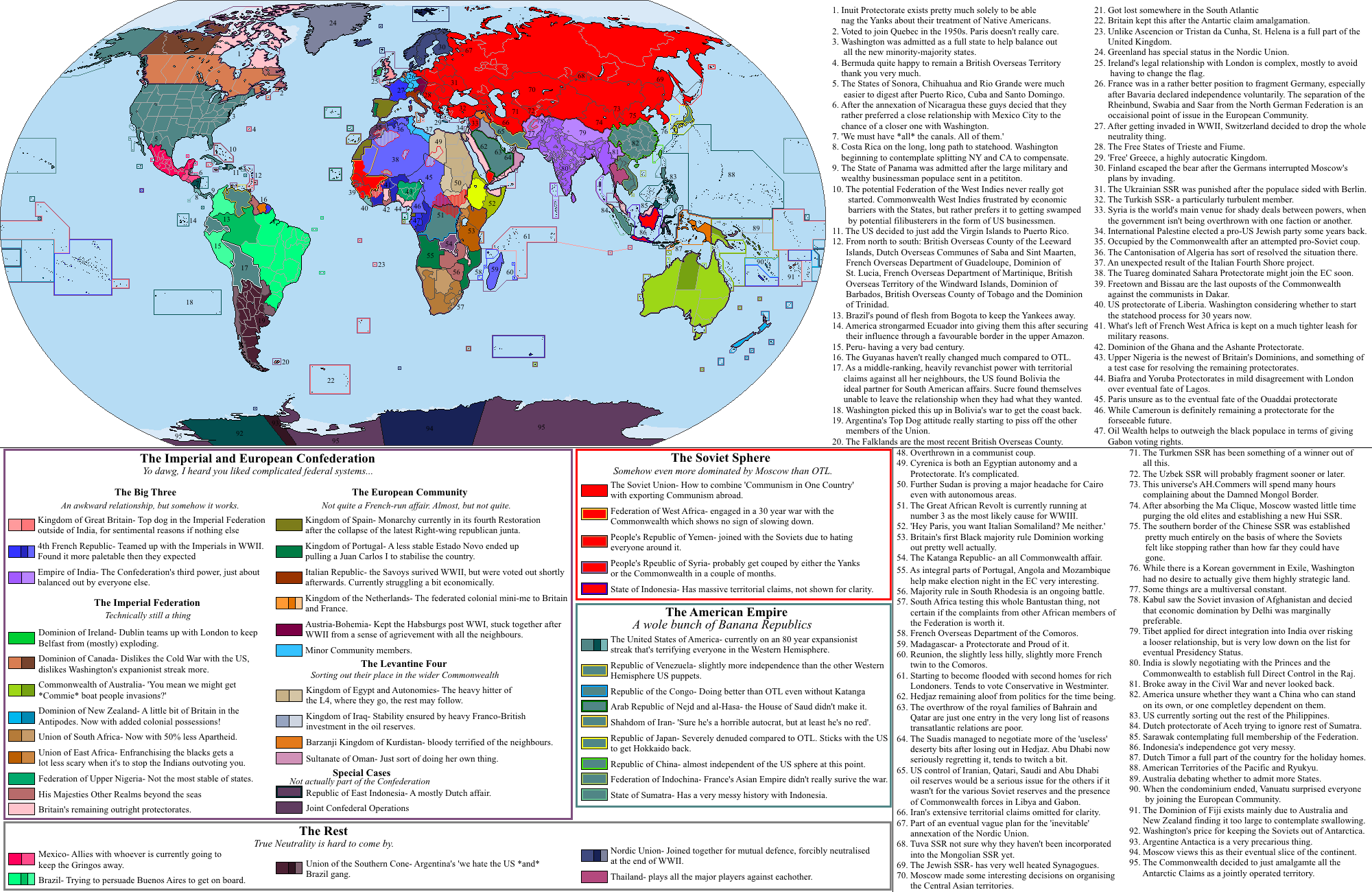DPKdebator:
In 1921, the Weltkrieg ended after seven long years of conflict. The Central Powers (mainly Germany, Austria-Hungary, Italy, and the Ottoman Empire, plus other allies) faced off against the Triple Entente (France, Britain, and Russia) and their allies. The main point of divergence in this scenario is Italy joining the Central Powers, giving the Central Powers less strain in the southern front and forcing France to defend its southern regions. The Lusitania is not sunk because the submarine that sunk it, U-20, departs later than it actually did due to a faulty engine needing to be repaired. The Zimmerman Telegram is not intercepted by the Americans, either, so there is little public resentment against the Germans in the United States.
Russia and France are squeezed into submission by the Central Powers in 1917 and 1919 respectively, but the British fought until late 1921, when dissent among the British public lead to communist uprisings in many of England's major cities, including London. Both parties met in the city of Brussels, Belgium, where a peace treaty was "negotiated" upon. The people of Germany were unhappy that the war had taken so long to stop, and wanted to severely punish the French due to propaganda leading the German public to believe that France was the reason why the war took so long. France was to give independence to the Occitans, Bretons, and Normans; cede more of Lorraine to the Germans; cede the city of Calais to the newly-founded Concert of Nations; cede the French Basque Country and Northern Catalonia to Spain; cede Savoie and other lands on the Italian border to Italy; return Menton and Roquebrune to Monaco; give away their entire colonial empire besides half of Algeria, the Ivory Coast, St. Pierre and Miquelon, and French Guiana; and pay 3 billion francs for war reparations to the Central Powers. On the other hand, Britain was given much more lenient terms in comparison to France. Britain was required to give independence to Ireland (as a kingdom with a German on the throne); cede the Channel Islands to Normandy; cede western Nigeria, Walvis Bay, and Sierra Leone to Germany; grant independence to the Boer Republics; give Germany use of the ports in Aberdeen and Plymouth if necessary; and pay 500 million pound sterlings for war reparations. Belgium was dissolved and replaced by the Kingdom of Flanders, a monolingual Dutch state that lost its eastern regions to Germany but was compensated with Dunkirk and the rest of French Flanders.
Many critics of the treaty saw it as too harsh, and stated that virtually dismantling a country as large as France would not go without major tremors. Those who supported the treaty dismissed these doubts at first, but shortly after the Treaty of Brussels went into effect in 1922, the supporters were proven wrong. Inspired by the Bolsheviks of Russia and the French Revolution of the late 1700s, French Communists took over Paris and other major French cities, proclaiming the People's Republic of France. Meanwhile, the rump United Kingdom prepares to strike back against the communists that control southern England. Austria-Hungary (in violation of a treaty between the two senior members that peacefully dissolved the empire) and the Ottoman Empire have collapsed into civil war, with the various minorities of the region wrestling for independence. It seems that no one, not even the mighty German and British empires, will be able to escape the effects of the Weltkrieg unscathed...

In 1921, the Weltkrieg ended after seven long years of conflict. The Central Powers (mainly Germany, Austria-Hungary, Italy, and the Ottoman Empire, plus other allies) faced off against the Triple Entente (France, Britain, and Russia) and their allies. The main point of divergence in this scenario is Italy joining the Central Powers, giving the Central Powers less strain in the southern front and forcing France to defend its southern regions. The Lusitania is not sunk because the submarine that sunk it, U-20, departs later than it actually did due to a faulty engine needing to be repaired. The Zimmerman Telegram is not intercepted by the Americans, either, so there is little public resentment against the Germans in the United States.
Russia and France are squeezed into submission by the Central Powers in 1917 and 1919 respectively, but the British fought until late 1921, when dissent among the British public lead to communist uprisings in many of England's major cities, including London. Both parties met in the city of Brussels, Belgium, where a peace treaty was "negotiated" upon. The people of Germany were unhappy that the war had taken so long to stop, and wanted to severely punish the French due to propaganda leading the German public to believe that France was the reason why the war took so long. France was to give independence to the Occitans, Bretons, and Normans; cede more of Lorraine to the Germans; cede the city of Calais to the newly-founded Concert of Nations; cede the French Basque Country and Northern Catalonia to Spain; cede Savoie and other lands on the Italian border to Italy; return Menton and Roquebrune to Monaco; give away their entire colonial empire besides half of Algeria, the Ivory Coast, St. Pierre and Miquelon, and French Guiana; and pay 3 billion francs for war reparations to the Central Powers. On the other hand, Britain was given much more lenient terms in comparison to France. Britain was required to give independence to Ireland (as a kingdom with a German on the throne); cede the Channel Islands to Normandy; cede western Nigeria, Walvis Bay, and Sierra Leone to Germany; grant independence to the Boer Republics; give Germany use of the ports in Aberdeen and Plymouth if necessary; and pay 500 million pound sterlings for war reparations. Belgium was dissolved and replaced by the Kingdom of Flanders, a monolingual Dutch state that lost its eastern regions to Germany but was compensated with Dunkirk and the rest of French Flanders.
Many critics of the treaty saw it as too harsh, and stated that virtually dismantling a country as large as France would not go without major tremors. Those who supported the treaty dismissed these doubts at first, but shortly after the Treaty of Brussels went into effect in 1922, the supporters were proven wrong. Inspired by the Bolsheviks of Russia and the French Revolution of the late 1700s, French Communists took over Paris and other major French cities, proclaiming the People's Republic of France. Meanwhile, the rump United Kingdom prepares to strike back against the communists that control southern England. Austria-Hungary (in violation of a treaty between the two senior members that peacefully dissolved the empire) and the Ottoman Empire have collapsed into civil war, with the various minorities of the region wrestling for independence. It seems that no one, not even the mighty German and British empires, will be able to escape the effects of the Weltkrieg unscathed...

Last edited:






